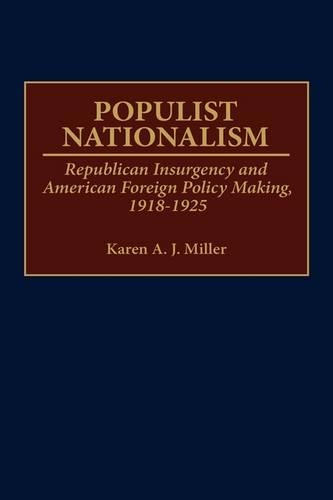
Populist Nationalism: Republican Insurgency and American Foreign Policy Making, 1918-1925
(Hardback)
Publishing Details
Populist Nationalism: Republican Insurgency and American Foreign Policy Making, 1918-1925
By (Author) Linda Karen Miller
Bloomsbury Publishing PLC
Praeger Publishers Inc
30th June 1999
United States
Classifications
Tertiary Education
Non Fiction
International institutions / intergovernmental organizations
Central / national / federal government policies
327.73
Physical Properties
Hardback
216
Width 156mm, Height 235mm
312g
Description
An examination of the skillful political maneuvering of William Borah and Hiram Johnson, two of the post-war leaders of Republican progressivism, this study analyzes efforts to prevent U.S. entry into the League of Nations despite overwhelming support for the organization among both Democrats and Republicans. Following the debacle of the 1912 election, the leadership of the Republican Party embarked on a strategy of reconciliation designed to end the acrimony between progressive and conservative factions so that it could unite against the Democratic Party. A small group of progressive Republicans quickly realized that they could threaten to resume infighting and could, thus, influence policy making on important foreign policy issues. This political environment enabled William Borah and Hiram Johnson to have an extraordinary influence over the Republican Party's position concerning the League of Nations, an organization which they regarded as an agency for the perpetuation of European empires and, therefore, a threat to American democracy. Borah and Johnson effectively intimidated their party leadership and blocked the American participation in the League. Once this pattern was established, it would continue to influence Republican Party actions, in particular the construction of the Republican Party platform in 1920, the U.S. position regarding the Washington Conference on Naval Disarmament, and the issue of U.S. membership in the World Court.
Reviews
"This is an outstanding study of Republican approaches to foreign relations in the 1910s and early 1920s and, more generally, of party and congressional politics in the making of modern U.S. foreign policy. Historians and political scientists interested in foreign affairs or domestic politics will learn much from this thoroughly researched, impressively argued book."-Ralph B. Levering Professor of History Davidson College
thoroughly researched and well-written...[T]his book is a fine example of historical scholarship. In detailing complexities and paradoxes of Republican and Congressional politics in the era from the Great War to the 1924 election of Calvin Coolidge, it adds to what is known about the travail of both Wilsonian international liberalism and US foreign policy. It also suggests interesting analogies for the present time.-Choice-Social & Behavioral Sciences
"thoroughly researched and well-written...This book is a fine example of historical scholarship. In detailing complexities and paradoxes of Republican and Congressional politics in the era from the Great War to the 1924 election of Calvin Coolidge, it adds to what is known about the travail of both Wilsonian international liberalism and US foreign policy. It also suggests interesting analogies for the present time."-Choice-Social & Behavioral Sciences
"thoroughly researched and well-written...[T]his book is a fine example of historical scholarship. In detailing complexities and paradoxes of Republican and Congressional politics in the era from the Great War to the 1924 election of Calvin Coolidge, it adds to what is known about the travail of both Wilsonian international liberalism and US foreign policy. It also suggests interesting analogies for the present time."-Choice-Social & Behavioral Sciences
Author Bio
KAREN A. J. MILLER is Assistant Professor of History at Oakland University./e Her research interests include a history of the Republican Party from 1912 to 1932.
